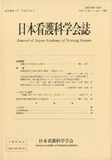Japanese
English
- 販売していません
- Abstract 文献概要
- 参考文献 Reference
要旨
障害児の母親が,育児を通して障害児を受容する過程,その過程において受容の節目となる時期(crisis period),また,母親の受容と育児を支えた重要な人物,および援助の内容を知ることを目的とした.対象は,22~29才の脳性麻痺者の母親28名であり,家庭訪問による面接調査を実施し,retrospective methodで回答を得た.
結果:(1)多くの母親は乳児期に子どもの障害に気づき,3才までに脳性麻痺の診断を受けていた.診断時の反応は,悲観型,楽観型,冷静型に大別された.(2)障害の受容過程において,特に乳児期が重要であった.しかし,その後も母親は多くの問題に当面しており,crisis periodは成長,発達過程を通じて存続していることが示唆された.(3)母親の受容を支える最も重要な存在は父親であり,ついで同じ障害を持つ母親であることが明らかになった.父親は,母親を主に精神的に支え,育児,家事,介護の手伝いなどの援助も行っていた.
Abstract
The purpose of this study was to understand:
1. The process by which mothers accepted their cerebral palsy children as their own children through rearing.
2. The crisis period in the process and the important persons for mothers as well as their roles.
The subjects were 28 mothers who had 22-29 years old cerebral palsy sons or daughters. They were inteviewed at their home in a retrospective method.
Results: Most of the mothers became aware of their children's disability in infancy and most of their children were diagnosed as cerebral palsy around 2 years old. Their reactions to the diagnosis were mainly classified into three types as pessimistic-type, optimistic-type, and realistic-type. Especially, the infancy of their children were very important in the process of the mothers' acceptance of their own children. It was suggested that crisis periods persisted during all times of growth and development of children, as mothers were confronted with many problems after that. It was clarified that the father was the most important person for supporting the mother's acceptance of cerebral palsy child. Also, the mother who had the same disabled children was secondary important person.
The fathers gave the mothers emotional support mainly and also helped the mothers to take care of children, to keep houses and to support children.
Copyright © 1989, Japan Academy of Nursing Science. All rights reserved.


